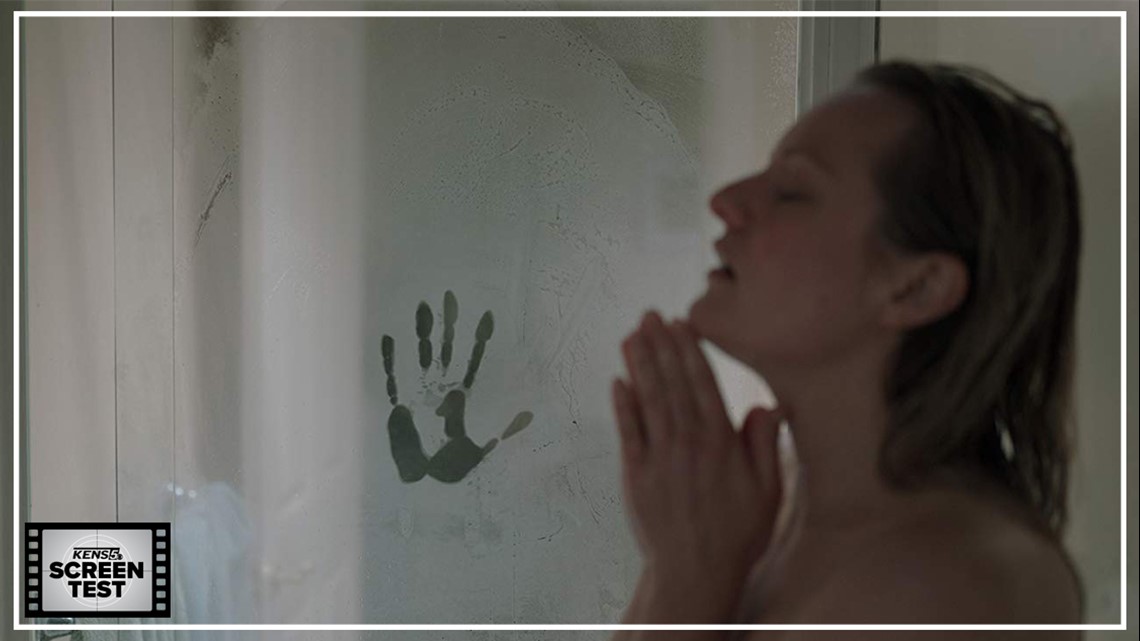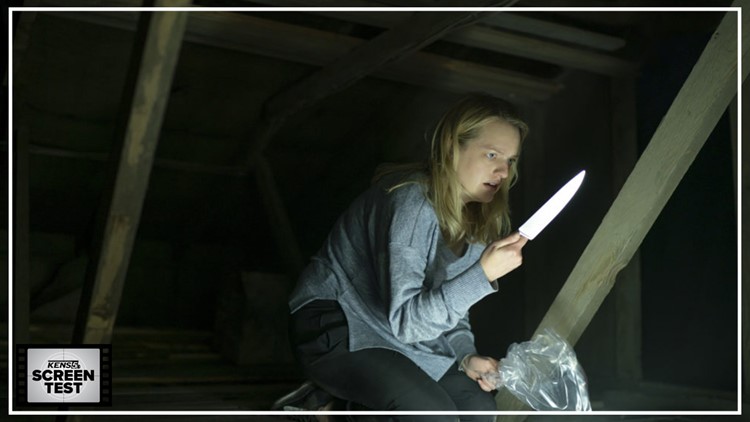If H.G. Wells’s 1897 novel “The Invisible Man” imagines that the scariest thing is that which is unseen, Leigh Whannell’s new big-screen adaptation realizes the scariest force is that which is unseen and perhaps not even in front us—but internalized, agonized over and shaped into an object by which we are made to interrogate our sense of reality.
The legacy of Wells’s story through the decades has been diluted to the elevator pitch of its title, serving as the inspiration for many a film, most recently the simple-minded “Hollow Man” movies of the 2000s and, on a more elemental level, 2003’s “The League of Extraordinary Gentleman.” More often than not, foundation tends to be the whole story when it comes to invisible men on the screen. Whannell’s iteration, however, is savvy enough to know that while the implications of its title can make for inspired set pieces, it can also be stretched into something more resonant than a one-note story. That doctrine has produced a great movie that is smart, satisfying and totally subversive in its recalibration of a 19th-century story into a modernized parable for the #MeToo era.
“He controlled everything,” says Elisabeth Moss’s Cecilia, after her sister has helped her escape her partner, Adrian (Oliver Jackson-Cohen), from his massive compound. Sitting on the edge of a cliff, it's a concrete monument to his status as one of the world’s foremost optics experts—the residence is more a facility than a home. He also, according to Cecilia, was someone who kept her in his psychological grip to the point where slipping out in the dead of night was the only feasible option (the opening sequence is a thrillingly eerie first sign that this “Invisible Man” won’t be like others before it). And, he is now apparently dead, having committed suicide two weeks after Cecilia’s departure, a span of time in which she’s found it difficult to get to the end of the driveway, for fear that Adrian is waiting to confront her. Her sister, Emily (Harriet Dyer), and a badge-wearing friend James (Aldis Hodge), no longer have to wonder what Adrian did to Cecilia; his death has allowed her to open up as a survivor of abuse at his hand.
What comes after the news of Adrian’s passing should be no surprise to anyone that’s watched a horror movie. Strange things begin happening in the friend’s home Cecilia is recovering in, increasingly leading her to compromise the reality she’s been told to believe with a reality that instinct is nudging her towards. A deft sensation of uneasiness, claustrophobic blocking of actors and some of the most considered use of sound since “A Quiet Place” help pull off expectedly creepy sequences when the gas on the stove is mysteriously raised and an intangible force taunts Cecilia. It's as if her trauma isn’t letting her off the hook.
She knows better than to question her mind. By proxy, we do too, although the longer cinematographer Stefan Duscio’s camera rests on an empty doorway, the more we’re inclined to question if what we think is there really is there. “He’s found a way to turn himself invisible,” Cecilia reveals at one point, to expected looks of disbelief from James and Adrian’s brother. A jar supposedly filled with his ashes says otherwise. Who are they expected to believe?
It’s by rather remarkable efficiency on the part of Whannell’s screenplay that “The Invisible Man” transcends its genre trappings fairly early on to tell a victim’s story, one in which the men around Cecilia – friend and otherwise – have the tendency to insist what her next course of action should be, to conclude that her increasing desperation is born from a threat in her mind and not of knives suspended in mid-air, of a stalker who needs to remain in control.
Sure, there are jump scares in “The Invisible Man,” but Whannell pinpoints the emotional isolation of a woman who isn’t believed as the movie’s more effective, and more urgent, conduit to tension. A brutal sequence set in a hospital late in the movie that makes victims out of several unfortunate souls directly contrasts earlier, more traditional jump frights—the capacity for violence is no longer in the shadows, just as the unjust condemnations of Cecilia’s behavior are no longer silent.


The writer-director can occasionally overindulge on an uber-deliberate style of filmmaking – and Benjamin Wallfisch’s abrasive score can actually soften the movie’s impact – but Elisabeth Moss’s frighteningly great turn as a woman whose cries for help are construed as paranoia keeps the affair grounded in modern truths. With eyes that always feel like they'll pop out of their sockets, Moss has practically become a go-to actress for giving a breakdown a cataclysmic, skin-shedding feel (See: “Us,” “Her Smell,” “Queen of Earth”). She’s more than capable of anchoring Whannell’s thematic intentions when his screenplay struggles to do so.
I won’t be the one who divulges the narrative twists and turns that Cecilia navigates in this movie’s homestretch, but suffice to say it’s as close to a guarantee that you won’t know where Whannell ends up going as this caliber of mainstream genre film leads you to expect. Some, I expect, will say that’s because it becomes another thing entirely in its final scene; indeed, the closing moments more closely resemble a dark Gillian Flynn tale than Wells’s age-old classic.
Crucially, the evolution that “The Invisible Man” and its woman protagonist undergo echoes the kind of new-age story Whannell has created—one whose familiar title echoes new crises, and which suggests how a sense of security will cease to be, in one bloody way or another.
"The Invisible Man" is rated R for strong bloody violence, and language.
Starring: Elisabeth Moss, Oliver Jackson-Cohen, Harriet Dyer, Aldis Hodge
Directed by Leigh Whannell
2020
OTHER SCREEN TEST REVIEWS:
- 'The Call of the Wild' Review: A very gruff Harrison Ford and a very not-real dog find adventure in sanitized survival story
- 'The Assistant' Review: A biting look at abuse of power and a workplace looking the other way
- 'Sonic the Hedgehog' Review: Sega speedster's live-action introduction, sans human teeth, has its moments
- 'Downhill' Review: It's all in the name
- 'Birds of Prey' Review: DCEU breaches R-rated territory with hellaciously fun, 'Parasite' Review: Bong Joon-ho's critique of socioeconomic systems is exacting, exciting and endlessly entertaining
- 'Gretel & Hansel' Review: There's evil in the wood, but maybe something more, too



